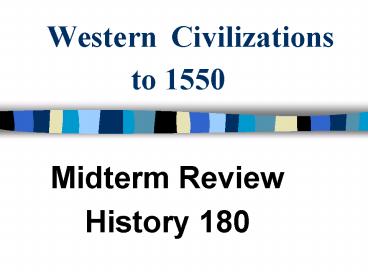Western Civilizations to 1550 - PowerPoint PPT Presentation
1 / 35
Title:
Western Civilizations to 1550
Description:
In an ancient Egyptian society women; ... Asserts that a kind of cosmic harmonizing places all things in the right relationship. ... The Philosophy of Stoicism ... – PowerPoint PPT presentation
Number of Views:397
Avg rating:3.0/5.0
Title: Western Civilizations to 1550
1
Western Civilizations to 1550
- Midterm Review
- History 180
2
The First cities were built in the area known as
- Sumer.
3
In an ancient Egyptian society women
- Could participate in legal actions.
4
The Egyptian concept of maat
- Asserts that a kind of cosmic harmonizing places
all things in the right relationship.
5
The Hittite kingdom collapsed because it
- Failed to discover a means of producing iron.
6
The major accomplishment of the Assyrians was
- The political unification of the ancient Near
East.
7
Minoan civilization reached its height
- Between 1550 B.C. and 1400 B.C.E.
8
The Iliad
- Describes a warrior aristocracy that glorifies
combat.
9
The basic means of livelihood for citizens of the
Greek city state
- Public works and warfare.
10
The Spartan State
- Subordinated the family to the state
11
One historical significance of Solons reforms is
that they
- Created Greeces first true democracy.
12
The Persian king Darius decided to invade Greece
in 490 B.C.E. because
- Athens had aided Greek cities in Asia Minor in an
attempted revolt against Persian rule.
13
Athens was ultimately defeated in the
Peloponnesian War because
- Her navy was defeated and she was unable to
import food
14
In the fifth century, the Greeks invented a way
if writing history that
- Was careful in its use of sources and was
concerned with motivation
15
Our best historical sources for the Persian and
Peloponnesian Wars are
- Herodotus and Thucydides
16
In comparison with Socrates, Plato was
- Less willing to believe that people could consult
their consciences to discover what is right.
17
The two states that lead the opposing sides in
the Peloponnesian war were
- Athens and Sparta
18
Macedonias emergence as a Hellenic power was due
to the resourcefulness of
- Decades of war between shifting alliances of
city-states.
19
Macedonias emergence as a Hellenic power was due
to the resourcefulness of
- Phillip II
20
Alexanders empire collapsed after his death
because
- He had not designated on heir.
21
Following the death of Alexander the Great in 323
BCE, the Near East was influenced by Greek
culture
- Hellenization
22
In the Hellenistic world, intellectual life
- Emphasized professional skills and competence.
23
The Philosophy of Stoicism
- Contributed to later Roman and Christian visions
of all humanity belonging to one universal family
24
In comparison with the Greeks, the Romans in the
fifth through the third centuries
- Demonstrated greater skill in dealing with
political conflict, both within the state and
among conquered peoples.
25
Sullas reforms were
- Conservative.
26
Hannibal's goal in invading Italy during the
Second Punic War was to
- Persuade Romes allies on the peninsula to switch
allegiances.
27
As the republic developed, Roman women
- Exercised far greater behind-the-scenes influence
than Greek women ever had.
28
In the first century BCE, as Roman imperialism
brought the state into further wars, the
political situation was dominated by
- Attempts of powerful generals to achieve
supremacy in Rome through use of the army.
29
The Second Triumvirate of Mark Antony, Octavian,
and Lepidus captured Rome by challenging the
authority of the
- Senate
30
The three unifying elements that allowed the
Roman empire to survive and work were the
- Emperor, the army, and civil servants and town
councils.
31
Hadrians Wall was built across Britain to
protect the province from invasion by the
- Celts
32
Which best describes Roman literature during the
centuries of the pax Romana
- Frequently used Greek works as models.
33
Which are NOT among the reasons given for the
disintegration of Roman control in western Europe?
- Emperors were opposed to the explosion of
Christianity in the West.
34
The so-called Edict of Milan issued by
Constantine in 313 CE
- Extended freedom of worship to Christians and
ended the age of persecutions.
35
The Donatist heresy was repudiated when the
orthodox church declared that
- The sacraments confer grace no matter what the
spiritual state of the priest who administers
them.































